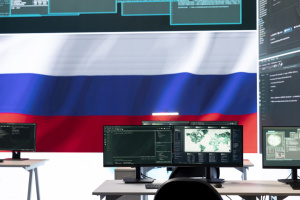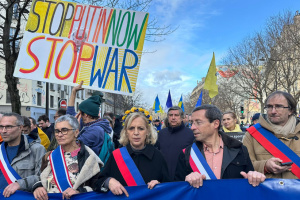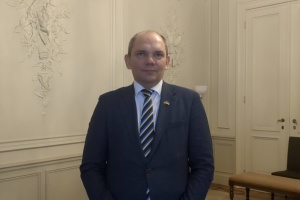
Operation “Demoralization.” Pro-Russian Telegram channels sowing discouragement among Ukrainians
This is a list of key messages that have been systematically disseminated by the network of anonymous Telegram channels since mid-autumn.
Back in 2021, the Security Service of Ukraine (SBU) officially informed the public that a number of channels on Telegram, including “Legitimny,” “Resident,” “Spletnitsa,” “ZeRada,” and related resources, operate in the interests of Russia's special services, trying to destabilize the socio-political situation in Ukraine.
Despite this, their Ukrainian audience remains huge, so messages and calls spun on these platforms make their way into local discussions on social media and chat messengers.
The Center for Strategic Communication and Information Security explains how, through anonymous Telegram channels, Russians are trying to demoralize Ukrainians and sow disbelief among them.
Darkness and hopelessness. Messages in Telegram channels
The campaign to demoralize Ukrainians is based on grim descriptions of the apocalyptic future of Ukrainian cities, which are supposed to be plunged into the darkness and cold as a result of missile attacks. An important component is the regular repetition of simple messages that intertwine with supposedly neutral reporting. Readers are being persuaded that:
● Russian missile attacks will last indefinitely, and it is impossible to defend against them;
● Ukrainian critical infrastructure will soon be out of service, and the energy sector will not be able to maintain it;
● prolonged blackouts will lead to a humanitarian catastrophe and a significant increase in crime rates in cities;
● the Ukrainian government will not be able to cope with the challenges and will be helpless in the context of crisis.
The first two messages are regularly called out by the Ukrainian Army and energy experts. The efficiency of the Ukrainian air defenses has increased significantly: during a massive shelling of the energy infrastructure on October 10, more than 50% of Russian missiles were shot down (43 of 84), on November 23 — more than 70% (51 of 70), on December 5 — 85% (60 of 70).
The efforts of energy experts are aimed not only at prompt repair of damaged objects and restoration of energy supply, but also at maintaining the power system in working condition by balancing it. The existing network is too powerful to be completely disrupted. But it is also impossible to avoid emergency and stabilization outages.
Restriction on street lighting in the conditions of shorter daylight in autumn and winter has had a negative impact on road safety but never led to a crime hike.
In planning a full-scale invasion, the Kremlin apparently counted on the “helplessness of the Ukrainian government.” But Ukraine did not “crumble” from the first blows and was able to inflict painful defeats on the enemy both on the battlefield and in the international arena. Ukraine has proven institutional stability in the conditions of war and secured powerful support of its partners. Attacks on energy infrastructure pose a major challenge that Ukraine will still be able to tackle.
At the same time, Telegram channels are trying to cause as much public anxiety as possible, convert people's general discontent into hate toward the central government, local authorities, residents of other regions, and even their own neighbors, who seem to get longer hours without blackouts. Target audiences are being diligently persuaded that they are being "treated unfairly."
The publications are based on both real information messages and outright fakes. The previous are statements by Ukrainian officials and excerpts from publications in foreign media. At the same time, malign messages are spun through “authors' comments.” Among others, the most common are:
● excerpts from “letters of dissatisfied readers” (although there is no feedback from such channels);
● photos of “official documents,” around which conspiracy is built;
● excerpts from fake “analytical notes” provided by “sources in the Presidential Office.”
A major vector in the efforts to demoralize Ukrainians is a smear campaign targeting Ukrainian refugees in EU countries, primarily Poland. Readers are being imposed the impression that:
- refugees are left to fend for themselves as their support is decreasing, while the government of Ukraine ignores the problems of citizens abroad;
- Ukrainians regularly get into all kinds of altercations, provoking them or becoming victims of attacks by aggressive local residents.
Similar messages are spread by Russian propaganda resources that do not mimic Ukrainian ones. The campaign is aimed at making Ukrainians feel hopeless, since “nobody is waiting for us,” and “there is nowhere to run.” This is again meant to push the idea that the only way out is to stop resistance and agree to “peace at any cost.” Channel admins make sure to pit those who left and those who stayed against each other to create an additional fake polarization line in society.
The main thing is despair. What the enemy wants
Circulation and numerous repetitions of these messages are aimed at demoralizing Ukrainians and devaluing the heroic struggle against the invaders. Russian propagandists are working to:
- deprive Ukrainians of faith in victory and convince them that resistance is futile;
- push the idea that it is not Russians responsible for any new destruction, but the Defence Forces of Ukraine and the military and political leadership refusing to yield to the enemy;
- undermine citizens’ trust in their own army, reduce the level of support for military personnel and volunteers, in particular financial support;
- convince Ukrainian society that there is no alternative to making concessions to the enemy and that the loss of territories and sovereignty is inevitable.
- Especially cynical are the attempts to depict the Russian strikes as acts of retaliation: for the destruction of the Crimean bridge or other sabotage on the territory of the Russian Federation. This way, they shift responsibility from the aggressor to the victim, trying to instil Stockholm syndrome in Ukrainians.
Mimicking the Ukrainian ones, the aforementioned Telegram channels supposedly “sympathize” with the suffering of Ukrainians and even condemn Russia's actions (while making sure to discredit the Armed Forces and Ukraine's leadership). But certain phrasing gives away the true Russian nature of these channels.
Therefore, the main task of the psyop is to spread despair among Ukrainians and fuel their desire to end the war, or at least stop the shelling of their infrastructure, giving the aggressors what they want.
It should be kept in mind that when the Kremlin signals that it wants “negotiations,” a “ceasefire” or “truce,” the real intention is to achieve an operational pause to restore and build up the capacity of their ground forces. This is the purpose of both public and private efforts of Russian diplomacy and missile terror against Ukrainian cities. Anonymous Telegram channels ensure information support for this operation, targeting public opinion, trying to manipulate Ukrainians and undermine public unity.
Such “suggestions” should be viewed critically. Mass graves discovered on the liberated territories of Kharkiv and Kherson region have demonstrated better than anything that the Russian occupation is much more dangerous for civilians than missile strikes or blackouts. Only expelling the enemy from Ukraine will guarantee safety and save human lives.
Center for Strategic Communication and Information Security




